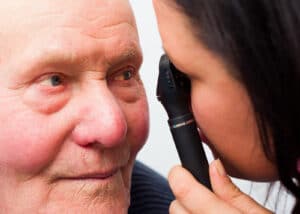A cataract occurs when a cloudy area appears on the lens of the eye. It can reduce vision and if not treated, a cataract can lead to blindness in the eye where it is located in. By having the support of someone like a personal care provider, they will have help in activities they can no longer see well enough to perform on their own, and your loved one can still live an independent life. Every year, the month of June is National Cataract Awareness Month. The goal of National Cataract Awareness Month is to bring awareness to this common condition, which if caught early enough can usually be corrected.
Cataract Symptoms

When cataracts are new and mild, your loved one may not notice any symptoms at all. Many people first discover they have a cataract when they visit their eye specialist for a routine test that looks for cataracts. Once a cataract grows, it can present some symptoms that your loved one will notice.
- They might struggle more to see in the darkness or bright light.
- They’ll notice halos around lights at night.
- Their vision will appear to be blurry or clouded over.
- They’ll see double.
- Colors won’t look as bright as they used to. The world’s colors become muted.
- They’re constantly having to update their eyeglass prescription.
Factors That Could Increase Your Loved One’s Risk of Developing a Cataract
More than half of those over the age of 80 will develop a cataract at some point, so the risk is already high if you are caring for an elderly loved one who is in their late 70s or older. But other conditions and lifestyle choices could increase his risk even more. Being made aware of these items that could increase your loved one’s risk for developing a cataract can help you assess if your loved one needs more frequent screenings or if a symptom should be reviewed more quickly than if they didn’t have additional risk factors.
- Long-term exposure to the UV rays of the sun without protection.
- Excessive exposure to heat, such as glass blowers or firefighters.
- Diseases such as diabetes can increase the risk.
- Long-term steroid use, such as that used by chronic arthritis sufferers.
- Smoking or tobacco use.
- Drinking too much alcohol.
- Family history of cataracts.
- Other eye conditions or injuries, such as glaucoma, surgery, or radiation.
When Surgery Isn’t an Option
If cataract surgery is not an option for your loved one, they will begin to lose some sight and might need more assistance around the home. One area many elderly people need help with, as they lose their vision, is centered around the personal care at home that they need in order to manage their daily activities. With a cataract, your elderly loved one may no longer be able to shave safely or trim any unwanted hair. They might struggle to see their feet, making nail care nearly impossible. A personal care at home provider can step in and assist your loved one with their personal care needs so that they can continue to look and feel their best. Personal care at home providers can also sometimes help with meal preparation if your loved one discovers they need help in that area as well.
Source: https://www.nei.nih.gov/learn-about-eye-health/eye-conditions-and-diseases/cataracts
If you or an aging loved one is considering Personal Care Services in Ashland, OH, please contact the caring staff at Central Star Home Health today. Call 419-756-9449
Central Star Home Health is a Trusted Home Care Agency in Ohio, including Ashland, Bellville, Bucyrus, Crestline, Galion, Lexington, Mansfield, Marion, Mt. Vernon, Ontario, Shelby, and Willard.
- Risk Factors for Cataracts - May 22, 2025
- Celebrating Our Team – May Highlights - May 21, 2025
- Helping Your Elderly Loved One Manage Multiple Medical Conditions - May 14, 2025

